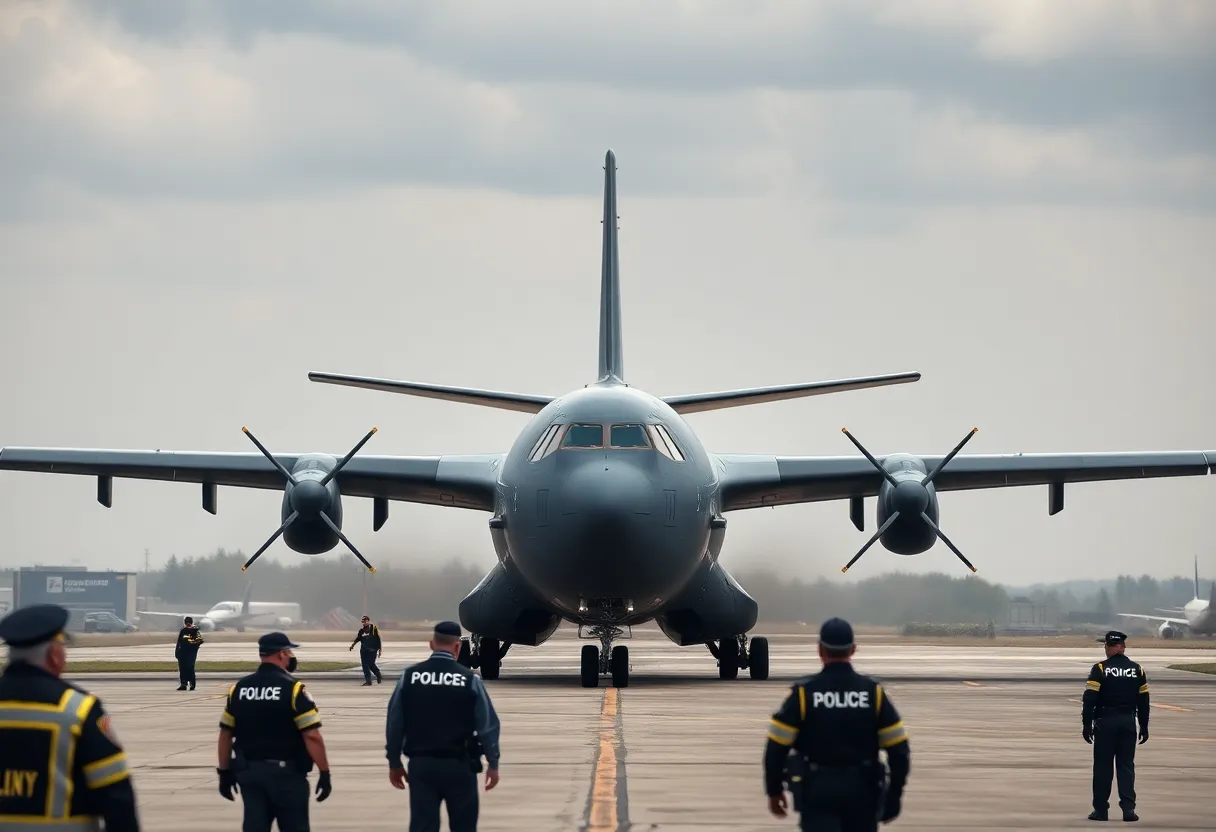News Summary
A U.S. Air Force C-17 Globemaster III transported 17 individuals labeled as violent criminals to El Salvador, igniting debate over human rights and legality. The deportees, connected to gangs like MS-13, face serious charges including murder and child rape, while activists raise concerns about the fairness of their classification and treatment in the Terrorism Confinement Center. The Trump administration’s approach, defended under immigration laws, is seen by critics as a misuse of power, prompting calls for reform.
Charleston, South Carolina – A Swift and Controversial Deportation
On March 31, 2025, a C-17 Globemaster III belonging to the U.S. Air Force touched down in El Salvador after making a significant journey from Joint Base Charleston in North Charleston, South Carolina. What was packed on that flight? Seventeen individuals who have been labeled as serious threats to society – dubbed “violent criminals” by the previous Trump administration and believed to have ties to notorious gangs such as MS-13 and Tren de Aragua.
The Journey of Transport
This military aircraft, known for its massive capacity and versatility, was involved in an operation that El Salvador’s President Nayib Bukele proudly hailed as a critical move against terrorism and organized crime. After all, Bukele, with a very public strategy against crime, shared a video via social media showing the C-17 landing in San Salvador. In this clip, Salvadoran law enforcement could be seen rigorously escorting the detainees from the plane, sending quite a loud message about the country’s ongoing fight against crime.
The Serious Charges
Upon arrival in El Salvador, these individuals were taken to a facility termed the Terrorism Confinement Center (CECOT) located in Tecoluca, a complex that has room for up to 40,000 inmates. Notably, within this group of deportees, the allegations are severe. All 17 individuals have confirmed connections to some of the most serious offenses, including murder and, disturbingly, six instances of child rape. It’s impossible not to view these figures through a lens of alarm given the grave nature of their crimes.
Scrutiny and Concerns
However, it’s not all as straightforward as it might seem at first glance. The legality of this operation has drawn the attention of human rights organizations, raising pressing questions about the method and rationale behind these deportations. Critics argue that deportees may not have been adequately represented or classified fairly – some even alleging that many individuals have been unjustly categorized as gang members without solid evidence linking them to any criminal activities.
Human Rights at Stake
As conversations heated up, the conditions in which these deportees are being detained have also come under fire. The CECOT is criticized for human rights violations, prompting concern from activists who emphasize the need for fair treatment of all individuals, regardless of the circumstances leading to their deportation.
Administrative Challenges
Adding fuel to the fire, there have been reports of “administrative errors” by the Immigration and Customs Enforcement (ICE) — in one instance, a Maryland man with protected legal status found himself wrongfully deported. Accusations of indiscriminate actions have led to unrest among immigration advocates, who feel that the entire system is flawed and in dire need of reform.
Legal Justifications Unraveled
The Trump administration defended the deportations under a combination of immigration laws and stretched interpretations of the Alien Enemies Act of 1798. Legal experts have raised eyebrows, arguing that such a broad interpretation of an 18th-century law may be both inappropriate and unconstitutional. They contend that the deportees might be suffering due to a misuse of power, with many never expressing any gang affiliations and having complied with existing immigration regulations.
A Complex Situation
The partnership between Bukele and the Trump administration, marked by mutual gratitude, unfolds against a backdrop of ongoing legal struggles surrounding immigration laws in the United States. As the dust settles from this particular operation, the debate about safety, humanity, and justice continues to resonate — with many left wondering where to draw the line when it comes to deportation and the rights of individuals caught in this tangled web.
Deeper Dive: News & Info About This Topic
HERE Resources
U.S. Government Acknowledges Mistaken Deportation Case
University of Minnesota Graduate Student Detained by ICE
The Changing Landscape of Media Consumption in 2025
Lawyer Warns Trump Administration on Immigration Policies
Charleston Community in Shock After Discovery of Human Remains
US Appeals Court Judge Questions Venezuelan Deportations
Trump Administration Targets Lawyers with Legal Retaliation Memo
Venezuela Announces Repatriation for Deported Citizens
Trump Administration Revokes Legal Status for Migrants
Trump Administration Moves to Revoke Legal Status for Over 1.8 Million Migrants
Additional Resources
- The New York Times: Maryland Man Deported to El Salvador
- Wikipedia: Deportation
- Associated Press: El Salvador Deportation
- Google Search: Trump Administration Deportation
- Wall Street Journal: ICE Deportation Controversy
- Encyclopedia Britannica: Human Rights
- The Hill: Due Process Survey for Migrants
- Google News: Human Rights Deportation

Author: STAFF HERE CHARLESTON
The CHARLESTON STAFF WRITER represents the experienced team at HEREcharleston.com, your go-to source for actionable local news and information in Charleston, Charleston County, and beyond. Specializing in "news you can use," we cover essential topics like product reviews for personal and business needs, local business directories, politics, real estate trends, neighborhood insights, and state news affecting the area—with deep expertise drawn from years of dedicated reporting and strong community input, including local press releases and business updates. We deliver top reporting on high-value events such as the Spoleto Festival USA, Charleston Wine + Food Festival, and the MOJA Festival. Our coverage extends to key organizations like the Charleston Metro Chamber of Commerce and the Charleston Museum, plus leading businesses in tourism and maritime industries that power the local economy such as South Carolina Ports Authority and the Charleston Visitor Center. As part of the broader HERE network, including HEREaiken.com, HEREbeaufort.com, HEREchapin.com, HEREcharleston.com, HEREclinton.com, HEREcolumbia.com, HEREgeorgetown.com, HEREgreenwood.com, HEREgreenville.com, HEREhiltonhead.com, HEREirmo.com, HEREmyrtlebeach.com, HEREnewberry.com, HERErockhill.com, HEREspartanburg.com, HEREaustin.com, HEREcollegestation.com, HEREdallas.com, HEREhouston.com, and HEREsanantonio.com, we provide comprehensive, credible insights into South Carolina's dynamic landscape.





